And so we come to the end of the ten-episode first season of the nu The Twilight Zone. Yes, it's been renewed for another season. So stand by for more "socially conscious storytelling". Something Rod Serling did occasionally with the original series. And for whatever reason the new creative team has decided to do every episode, all the time.
And yes, E09 and E10 have lots of "socially conscious storytelling". They're slightly more interesting than the eight episodes preceding them. And you can read all about them in my reviews here and here.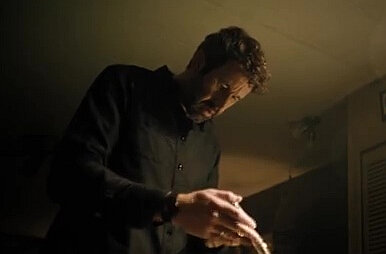 Let's start with "The Blue Scorpion". The Blue Scorpion is the name of the gun that features in the episode. Jeff Storck (Chris O'Dowd) is an anthropology professor who is apparently living with his father (or his father, Otis, is living with him) while he goes through a messy divorce. One night Jeff comes home to discover Otis killed himself with a gun and a bullet with Otis' name literally on it. The name fades away, and later the police tell Jeff, Otis left a note saying, "I love him more than you."
Let's start with "The Blue Scorpion". The Blue Scorpion is the name of the gun that features in the episode. Jeff Storck (Chris O'Dowd) is an anthropology professor who is apparently living with his father (or his father, Otis, is living with him) while he goes through a messy divorce. One night Jeff comes home to discover Otis killed himself with a gun and a bullet with Otis' name literally on it. The name fades away, and later the police tell Jeff, Otis left a note saying, "I love him more than you."
Jeff holds onto the gun, the Blue Scorpion, because of the scorpion inscribed on its butt, and eventually a helpful gun dealer tells him by phone it's a rare gun and lots of people want it. The gunmaker, Eulogio Cienfuegos (HITG Alex Daikun) shows up as a ghost or a manifestation or something, to tell Jeff the Scorpion doesn't like the darkness.
Professor Jeff soon spins out of control, obsessing about the gun. He discovers the name "Jeff" has appeared on the bullet, and starts hearing the name "Jeff" everywhere. It turns out his ex-wife Anne's new lover is named Jeff. Her divorce lawyer is named Jeff. The gun dealer is named Bob Jeff. So the question is, will Jeff shoot himself? Or will he shoot his wife's new boyfriend or the vaguely snippy divorce lawyer? Or someone else. Anne wants to get some of Jeff's personal things in the settlement, and that doesn't sit well with him, either.
Jeff eventually becomes so obsessed he stalks Anne and parks outside her house. A local burglar that was gaslit earlier in a newscast attacks Jeff, and the Scorpion goes off and kills the guy. The police arrive and discover from the robber's ID that his name was... Jeff.
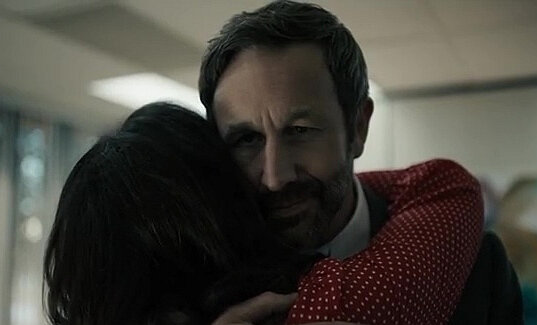
In the end, everything goes pretty much Jeff's way. He's hailed as a hero of the community, gets a promotion at the university, and Anne relents on the settlement terms. Jeff tosses the Scorpion into the lake where they dumped his father's ashes, but two kids find it when it washes ashore and they start playing with it. They also find a bullet, and one boy's name appears on it. And so the cycle continues.
O'Dowd gives a good performance. However, despite the fact the episode is twice as long as an original The Twilight Zone episode, it runs in fits and starts. Jeff seems to go from normal guy to fruitcake in a matter of minutes. And yet the episode grinds to a halt to feature a student talking to Jeff about how she thinks objects around her are living things. Which seems to be a big chunk of the socially conscious message of the episode: some people get obsessive about guns.
Disclaimer: I don't own a gun, or have any desire to. But the people I know who own guns aren't obsessive about them. The episode feels like writer, Glen Morgan writing about something he doesn't know. Are there people out there in real life who are obsessive about their guns? No doubt. But they seem to crop up more on TV and movies then in real life.
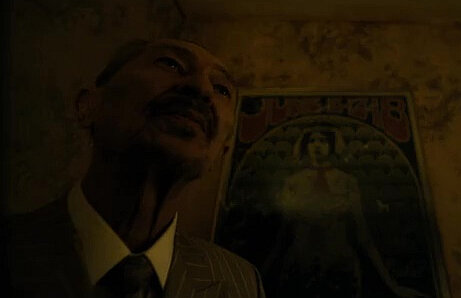
And Morgan does present a relatively balanced commentary on guns. Jeff goes to a firing range and they question him closely. Bob Jeff asks how Jeff got the gun and checks the background as best he can. But the basic message still boils down to "Guns bad". True or not, it's not particularly nuanced. And there are some weird elements, like Eulogio appearing for no particular reason except to provide some exposition about things we already know, and the gun not wanting to be in the dark. So what?
I also wonder if sometimes the metaphors on the nu Twilight Zone are too specific, and thus become meaningless. Serling struck at certain universal truths: The enemy is just like us. Imagination can get away from you. Authoritarianism is bad and relies on the same old tricks. But taking on 2019 gun violence is too specific, but at the same time it disguises it as a magical pistol that wields an unseemly influence on its owner. Wouldn't the metaphor be more effective if the gun wasn't fantastical? Anti gun-types figure the episode fulfills all of their beliefs and some of them wonder why the show is preaching at them. But gun owners can say, "Well, that's a fantasy, and it never happens in real life and TZ is just a make-believe show."
The specific preaching also becomes a bit tiresome. I don't need the creative team preaching at me that guns are bad and (a relatively few) people are obsessed with them. If I don't go to a church to hear a minister preach about something I already know, why would I turn on the TV to watch a writer do the same?
The tenth and final episode of the season is "Blurryman". Which is a weird horror movie/homage/love letter to the original TZ. I see where the creative team (and writer Alex Rubens) were trying to go. But there's so many mixed messages it's more a bunch of a muddle than anything.
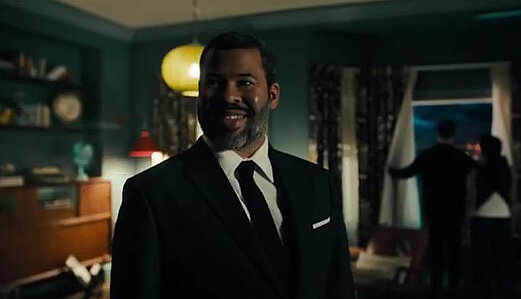
Writer Adam Wegman (Seth Rogen) is in his apartment working on a movie or TV episode which involves a nuclear holocaust. Just as he figures he should start with the explosion rather than end with it, his nervous wife Betty comes in and worries about "the reapers". Adam throws open the curtains and finds a nuclear landscape outside. Cut to Jordan Peele doing an intro about how writers should be conscious of their social responsibilities, and… Peele stumbles over his line and breaks character. And we realize we're watching the filming of a Twilight Zone episode.
Peele calls for the episode writer, Sophie (Zazie Beetz). They have an awkward discussion about whether Twilight Zone is horror or social commentary. And a stage hand mentions Sophie referenced blurriness in her narration speech, and there's a "Blurryman" who has appeared in the background of many of the filmed episodes and no one knows who he is or how he got there.
Pretty meta, right? Sophie confirms Blurryman exists, and then she finds herself trapped on the sound stage with Blurryman as everyone else goes home for the night or disappears or something. They mention no one can find Peele, but why he goes missing and everyone else disappears is one of the extraneous and irrelevant points of the episode.
Blurryman shows up and starts chasing Sophie around the sound stage, telekinetically throwing books and liquor bottles at her. She runs, twists her ankle, discovers everyone has returned but no one can perceive her. We eventually get a flashback to Young Sophie's childhood when she liked to watch The Twilight Zone (she's watching the episode "Time Enough at Last", and there are library steps on the sound stage with a pair of broken glasses on them). And her mother says Sophie doesn't have to choose between reality and watching TZ.
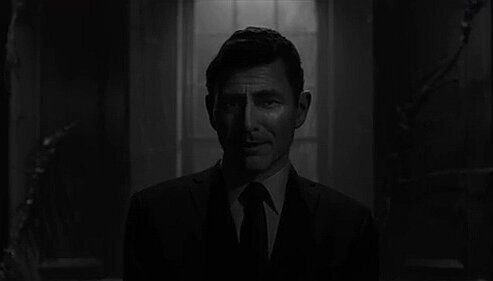
And eventually Blurryman reveals he's... Rod Serling (a CGI recreation involving Ryan Hesp, Jefferson Black, and Mark Silverman). Rod blithely tells the limping terrified Sophie "I take it I have your attention" and "There's a lot to explain", and leads her through a door into a dimension of doors without an explanation. Said dimension is presumably... the Twilight Zone. Dum-dum-dum.
And dumb dumb dumb. For one thing, the episode is padded, even at a relatively slim 37 minutes compared to the usual length of nu Twilight Zone. Sophie spends a lot of her time running around the sound stage, limping and screaming and yelling at her pursuer like the Final Girl in some horror movie. It's boring.
The episode isn't particularly flattering to Rod Serling. Apparently he throws books and bottles at a woman, and drives her to twist her ankle, just to get her attention. He couldn't send a note?
Having the protagonist a woman who gets chased a lot lies at the heart of the episode. Without it, the episode would be 15 minutes shorter, but they can't have a 22-minute episode because that's too short. Most of what happens wouldn't happen if it were a male protagonist. And writer Alex Rubens is male. If he's writing some kind of personal homage to the original TZ, why not have a male writer as his stand-in? Presumably because the episode would be even goofier if a male writer was running around screaming and twisting his ankle.
The episode portrays Peele as a bit of a jerk. He breaks character, questions the "sanctity" of the original TZ, and comes across as a parody of himself. I suppose you could say Peele likes to poke fun at himself, but his portrayal here is only mildly amusing at best. Doesn't "poking fun" require some funniness?
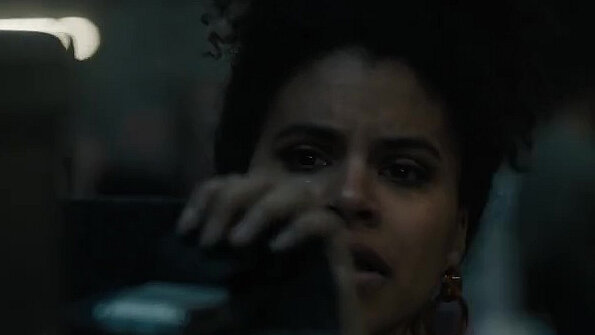
So if the episode is unflattering to Serling and Peele, what is it about? Some reviewers have said it's a "love letter" to the original TZ. But it doesn't come across that way. There's a thin line between undermining the audience's expectations ("The mysterious figure that is terrorizing Sophie is Rod Serling and he really isn't trying to be terrifying") and playing into the fantasy: "Rod Serling is a mysterious figure terrorizing Sophie." The episode goes way too far for the latter, and for no particular reason. As I noted, couldn't Serling's ghost, or spirit, or extra-dimensional presence send a note? Earlier, he alters Sophie's cue card narration to imply he's there: why not do that? Having cue cards that change to convey messages (ala Danny the Street in Doom Patrol) would be much more impressive than a Blurryman scaring the bejesus out of Sophie just to get her attention
"Blurryman" seems mostly like an exercise to show off how the FX team could bring Rod Serling "back to life" through the wonders of CGI. Something Robert Zemeckis pulled off in 1995 on Tales from the Crypt. And Steve Martin et al. pulled off in 1982 with Dead Men Don't Wear Plaid. There's a certain amount of desperation in Rubens having Sophie mouth a defense of TZ's "socially conscious storytelling". If the creative team is really confident in that approach, then let it speak for itself. Writing an episode in part just to defend the concept, much less placing it last in its first season run, is over the top at best, and useless at worst.
As I noted in my review of "The Obsolete Man", my main gripe with the episode and most of the new run is it doesn't feel... personal. Most of the episodes feel like they're "made by committee" by people who watched TZ episodes but missed one of the main points. The original TZ was personal. You watched to find out what Serling (and to some degree Matheson, and Beaumont, and Hamner, and a few other writers) were thinking. There have been a couple of nu TZ episodes like that: "The Comedian"--also by Alex Rubens--felt like he was saying something based on his personal experiences. "Replay" felt like Peele and writer, Selwyn Seyfu Hinds taking a look at modern-day racism and to some degree how it touches on them.
"Blurryman" doesn't feel like it's personal to Rubens. Maybe it was supposed to be, but Rubens making the protagonist female and putting her through the equivalent of a slasher horror movie for 75% of the episode just doesn't make it feel personal. "Blurryman", and most of the first season of nu TZ, feels like the creative team striving for "socially conscious storytelling" with every episode. Rather than just let it come, like Serling did a relatively few times. Serling was more concerned with the "storytelling", the current creative team comes across as more concerned with "socially conscious".
But that's just my opinion, I could be wrong. What do you think?
Written by Gislef on Jun 2, 2019




Makes me wonder why the constant remakes. They'll never measure up to the original and always run into issues like the ones pointed out in this review.